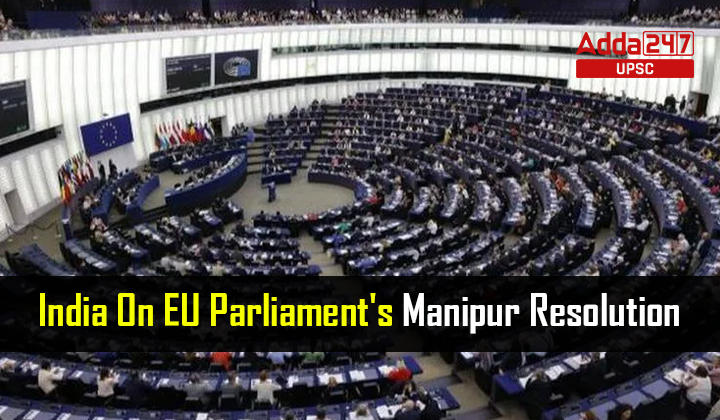Table of Contents
Introduction
The European Parliament, based in Strasbourg, France, has adopted a resolution on the human rights situation in India, specifically addressing the recent clashes in Manipur. The resolution calls on Indian authorities to take measures to halt ethnic and religious violence and protect religious minorities. However, India has rejected the resolution, considering it “unacceptable” and a reflection of a “colonial mindset.”
India’s Response and Rejection of Interference
The Ministry of External Affairs spokesperson, Arindam Bagchi, responded to the resolution, stating that such interference in India’s internal affairs is unacceptable and demonstrates a colonial mindset. Bagchi emphasized that Indian authorities, including the judiciary, are actively addressing the situation in Manipur and taking steps to maintain peace, harmony, and law and order. India suggests that the European Parliament should focus on its internal issues instead.
Efforts to Address Concerns
Foreign Secretary Vinay Kwatra confirmed that efforts have been made to reach out to the concerned EU parliamentarians and clarify that the situation in Manipur is strictly an internal matter for India. The Indian government aims to emphasize sovereignty and autonomy in dealing with internal affairs.
The Situation in Manipur and the Resolution
Manipur has experienced violent clashes, particularly between the Kuki and Meitei communities, for nearly two months. The resolution titled ‘India, the situation in Manipur’ was initiated by Pierre Larrouturou, a Member of the European Parliament from the Group of the Progressive Alliance of Socialists and Democrats. The resolution urges Indian authorities to take immediate action to end the ethnic and religious violence and protect religious minorities. It calls for independent investigations into the violence and emphasizes the importance of trust-building and mediation among conflicting parties.
Human Rights Concerns and EU-India Partnership
The European Parliament’s resolution further advocates for the integration of human rights into all aspects of the EU-India partnership, including trade. It emphasizes the need to reinforce the EU-India Human Rights Dialogue and encourages the EU and its member states to raise human rights concerns, such as freedom of expression, religion, and the space for civil society, during high-level engagements with India.
Conclusion
The adoption of the resolution by the European Parliament has led to a disagreement between India and the EU. While India considers the resolution an unacceptable interference, the European Parliament stands firm in its call for action to address the human rights situation in Manipur. The resolution highlights the importance of human rights in the EU-India partnership and seeks to encourage dialogue and mediation to ease tensions. The differing perspectives on this issue reflect the complexities of international relations and the challenges in addressing human rights concerns on a global scale.
| Follow US | |
| UPSC Govt. Jobs UPSC Current Affairs UPSC Judiciary PCS Download Adda 247 App here to get the latest updates |



 TSPSC Group 1 Question Paper 2024, Downl...
TSPSC Group 1 Question Paper 2024, Downl...
 TSPSC Group 1 Answer key 2024 Out, Downl...
TSPSC Group 1 Answer key 2024 Out, Downl...
 UPSC Prelims 2024 Question Paper, Downlo...
UPSC Prelims 2024 Question Paper, Downlo...




